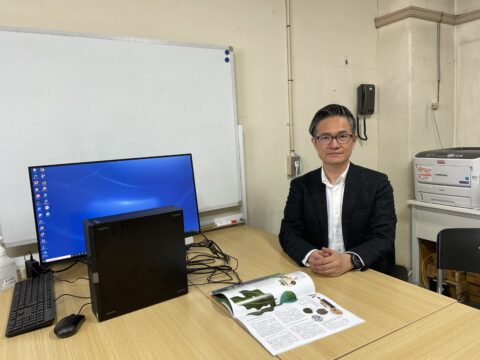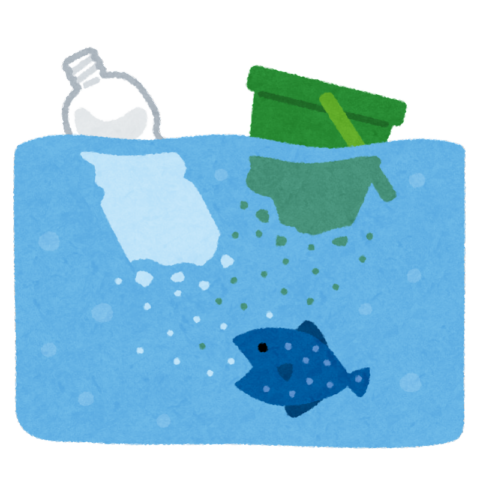Introducing Professor Mitsuo Yamamoto and his Innovative Research Lab
Sep. 20, 2023
Interviewed by Lamichhane Grishma, IPADS, M1 Student

Meet Professor Mitsuo Yamamoto, a researcher in Environmental Science who holds the position of Professor at IPADS, Graduate School of Agricultural and Life Sciences at the University of Tokyo (UTokyo). With his extensive knowledge and experience in the field, Professor Yamamoto shares his insights on his area of expertise, research interests, ongoing projects, and what he hopes to impart to future students.
- Dear Professor Mitsuo YAMAMOTO, being an Environmental Science researcher, what are the primary areas of your research and your research interests?
The main research interest of my laboratory is environmental science, particularly aquatic environmental chemistry and environmental chemical engineering. My interest in this field stems from a desire to address environmental issues, which began during my graduate studies. I graduated from the Graduate School of Engineering. I mainly conducted fundamental experimental research during my graduate and doctoral studies. However, after completing my doctoral degree, I changed my area of research. Although my main topic is still related to Environmental Science, I shifted my focus from fundamental research to actual field studies, especially on marine environments. My overarching goal, however, remains the same: to conduct research that addresses environmental issues and positively impacts the environment.
- Could you shed light on the research projects your lab is currently working on?
 Sure. We are currently working on three main research topics. The first is seaweed bed restoration, where we are developing a method to restore the seaweed beds using iron fertilizer. We found that the lack of iron in coastal areas was one of the main factors leading to the depletion of seaweed beds. Through fundamental studies and field tests in Hokkaido, we have confirmed the effectiveness of this method. The second research topic is the conservation of coastal ecosystems and environments. We are evaluating material dynamics such as iron, nitrogen and phosphorus in coastal areas and river basins to better understand the forest-river-sea linkage and the impact of land use on estuarine environments. The third research topic focuses on developing plastic alternatives from agricultural waste in Africa. We are collaborating with UNIDO (United Nations Industrial Development Organization), and university and research institute on this project and related institutes in Africa to promote sustainable agricultural practices and encourage the use of sustainable alternatives to plastic. In addition, I belong to the UTokyo Ocean Alliance Collaborative Research Organization, which collaborates with many international organizations. I am in charge of the overseas intern program at the Ocean Alliance, where graduate students go to international organizations for internships. We have also evaluated the educational effects of these internships on students’ career paths.
Sure. We are currently working on three main research topics. The first is seaweed bed restoration, where we are developing a method to restore the seaweed beds using iron fertilizer. We found that the lack of iron in coastal areas was one of the main factors leading to the depletion of seaweed beds. Through fundamental studies and field tests in Hokkaido, we have confirmed the effectiveness of this method. The second research topic is the conservation of coastal ecosystems and environments. We are evaluating material dynamics such as iron, nitrogen and phosphorus in coastal areas and river basins to better understand the forest-river-sea linkage and the impact of land use on estuarine environments. The third research topic focuses on developing plastic alternatives from agricultural waste in Africa. We are collaborating with UNIDO (United Nations Industrial Development Organization), and university and research institute on this project and related institutes in Africa to promote sustainable agricultural practices and encourage the use of sustainable alternatives to plastic. In addition, I belong to the UTokyo Ocean Alliance Collaborative Research Organization, which collaborates with many international organizations. I am in charge of the overseas intern program at the Ocean Alliance, where graduate students go to international organizations for internships. We have also evaluated the educational effects of these internships on students’ career paths.
- Dear Professor, what are the actual targets of your research, and how important is it to society?
These research topics are essential to society as they address critical environmental challenges. For instance, restoring seaweed beds is crucial for preserving marine biodiversity and providing ecosystem services, which also contributes to blue carbon sequestration. Similarly, conserving coastal ecosystems is vital for maintaining healthy ecosystems, which are essential for sustainable development. Developing sustainable alternatives to plastic from agricultural waste is also important in reducing plastic pollution, which has become a global environmental concern.
Furthermore, our interdisciplinary education and internship programs aim to develop the next generation of leaders in environmental and ocean-related fields. The evaluation of these programs on students’ career paths will help to improve the effectiveness of future educational programs in addressing environmental challenges.
- Do you have any messages for future students or students interested in this field of study?
To all prospective students interested in environmental science and related research fields, I welcome you to our program and laboratory with open arms. Environmental Science is a vast and important field not limited to a single discipline. It encompasses various areas such as agriculture, engineering, and others. This means that students from diverse academic backgrounds can pursue their interests in environmental science.
Our laboratory focuses on a holistic approach to addressing environmental challenges. We believe that a single method cannot solve environmental issues, and therefore, our research topics are diverse and interdisciplinary.
We also welcome students who are interested in field research or fieldwork. Field research provides hands-on experience and helps students develop practical skills. It also offers an opportunity to work with communities and stakeholders and understand their interests, which is crucial in developing sustainable solutions.
We are proud of the IPADS program’s diversity and welcome international students. We believe it is essential to include diverse perspectives in our research to create comprehensive and impactful solutions. Our program offers various opportunities for international students to collaborate and work with international organizations, providing exposure to diverse environmental challenges and solutions worldwide.
In conclusion, we provide an excellent opportunity for students who are passionate about environmental science and related research field. We encourage you to join our program and our laboratory and work toward creating a sustainable future for all.
Editor’s Note:
I recently had the pleasure of speaking with Professor Mitsuo Yamamoto, a renowned researcher in the field of environmental science. Professor Yamamoto heads a laboratory that focuses on aquatic environmental chemistry and environmental chemical engineering, with the goal of conducting research that addresses environmental issues and has a positive impact on the environment.

During our conversation, Professor Yamamoto shared details about the three main research topics his lab is currently working on. The first is the restoration of seaweed beds using iron fertilizer, with field tests in Hokkaido confirming the method’s effectiveness. The second topic involves evaluating material dynamics in coastal areas and river basins to better understand the forest-river-sea linkage and the impact of land use on estuarine environments. Lastly, the lab is collaborating with UNIDO and a university in Africa to develop plastic alternatives from agricultural waste, promoting sustainable agricultural practices and reducing plastic pollution.
These research topics have significant societal importance as they address critical environmental challenges such as preserving marine biodiversity, conserving coastal ecosystems for human well-being and sustainable development, and reducing plastic pollution, which has become a major global environmental concern.
In addition to his research, Professor Yamamoto is also involved in interdisciplinary education and internship programs to develop the next generation of leaders in environmental and ocean-related fields. Evaluating these programs on students’ career paths will help improve the effectiveness of future educational programs in addressing environmental challenges.
Overall, Professor Yamamoto’s research and dedication to addressing environmental issues through both practical field studies and interdisciplinary education programs demonstrate his impact on the field of environmental science and his commitment to creating a more sustainable future.